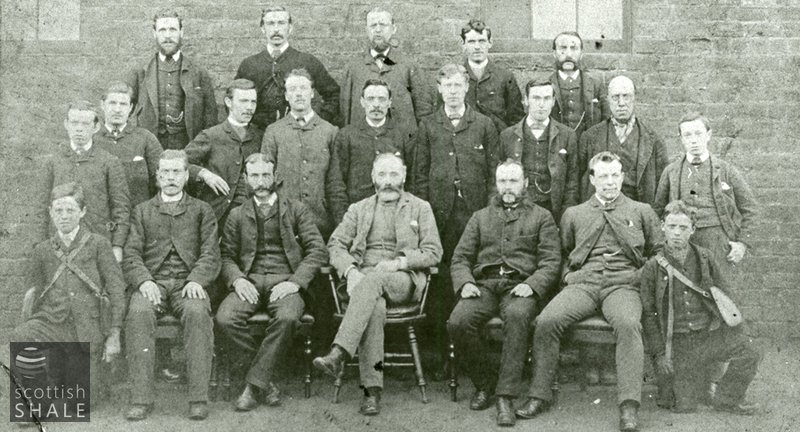Timekeeper
also assistant timekeeper, time office worker, bag boy
Group photograph of clerical staff at Addiewell works c.1885. Might the youngsters on the front row be Bag Boys? See full record; R10-00107
The timekeeper was responsible for checking and recording the starting and finishing times of workers.
Working as bag boys for the time office or "time box" was the first job that many young boys would do when they started work in the oil works. Every day they would go round the works and mines to collect time and output books etc. They would also go to the railway station twice a day to take and collect the goods received book and collect the consignment notes of dispatches by rail that day. The bag boys would also collect mail from the dispatch office to take back to the works.
Wages & Working Hours
According to the Board of Trade Census of Wages, the average weekly wage of a timekeeper in 1886 was 24s 1d.
"There was a big board up with all numbers and checks. I would reckon there would be about six hundred and odd checks and that's not counting the staff. See the staff didn't check in and out and the timekeeper then was Jock Miller from East Calder. Jock was a hell of a nice bloke. Hearts daft, too, and of course he died sudden too! Great football player, too! And he wasn't strict. So anyhow, Jock used to say, "When are you going for the time". We used to use the book, we used to go the joiner's shop, engineer's shop, blacksmith's shop, plumbers, metalmakers and where the.....Paddy Carr's place, and got all their time, what they were doing, what jobs they were on, and we used to enter them all into the book. We used to take it back to the timebox and the timekeeper used to lift it all out". HF, Pumpherston Refinery, circa 1932
Additional Resources
- Oral history transcript: Hugh Fry
- Oral history transcript: Mr Thomas Hill
- Oral history transcript: Mr David Horsburgh
- Oral history transcript: Mr George Lyon
